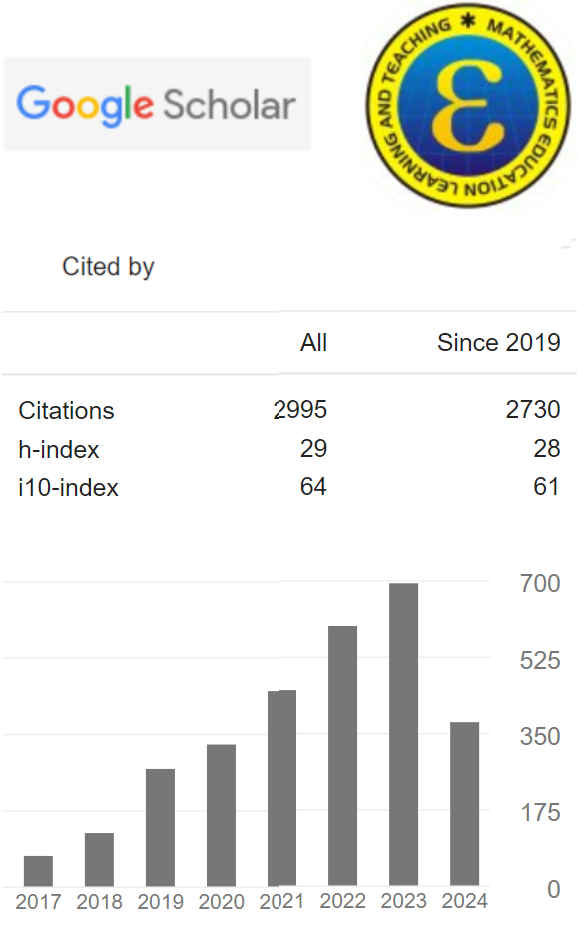Algebraic Reasoning of Student with Keirsey Personality Type in Solving Mathematical Problem
(1) Universitas Negeri Surabaya
(*) Corresponding Author
Abstract
Algebraic reasoning is an important skill for students to support in learning mathematics, especially on algebraic topics. This research is aimed at describing students’ algebraic reasoning to solve problems based on Keirsey's personality types. This research used qualitative with a descriptive approach and was conducted involving four students who have equal mathematical abilities and the same gender. The selected students represented Keirsey’s personality types. The selection of students was carried out through two types of tests, namely the Keirsey Temperament Sorter (KTS) and the Mathematics Ability Test (MAT). The result showed that students with Guardian and Idealist personality types liked to use regular and coherent procedures to solve the problem. Then, students with rational and artisan personality types prefer to use complete explanations. So, teachers can improve students' algebraic reasoning skills by facilitating each student based on their personality type, such as developing learning activities that can include every student's algebraic reasoning ability
 ÂKeywords
Full Text:
PDFReferences
Andriani, P. (2015). Penalaran Aljabar dalam Pembelajaran Matematika. Beta: Jurnal Tadris Matematika, 8(1), 1-13. https://jurnalbeta.ac.id/index.php/betaJTM/article/view/20
Arslan, C., Göcmencelebi, S. I., & Tapan, M. S. (2009). Learning and reasoning styles of pre service teachers’: inductive or deductive reasoning on science and mathematics related to their learning style. Procedia-Social and Behavioral Sciences, 1(1), 2460-2465. https://doi.org/10.1016/j.sbspro.2009.01.432
Aryani, F., Amin, S. M., & Sulaiman, R. (2018, January). Students’ Algebraic Reasonsing In Solving Mathematical Problems With Adversity Quotient. In Journal of Physics: Conference Series (Vol. 947, No. 1, p. 012044). IOP Publishing. https://doi.org/10.1088/1742-6596/947/1/012044
Brodie. (2010). Teaching Mathematical Reasoning in Secondary School Classroom. Springer.
Dewiyani, M. J. (2009). Karakteristik Proses Berpikir Siswa Dalam Mempelajari. Prosiding Seminar Nasional Penelitian, Pendidikan Dan Penerapan MIPA, 481–492.
Herbert, K., & Brown, R. H. (1997). Patterns As Tools. Teaching Children Mathematics, 3, 340–345.
Huitt, W. (1992). Problem solving and decision making: Consideration of individual differences using the Myers-Briggs Type Indicator. Journal of Psychological type, 24(1), 33-44. https://psycnet.apa.org/record/1994-45082-001
Indraswari, N. F., Budayasa, I. K., & Ekawati, R. (2018, January). Algebraic Reasoning in Solving Mathematical Problem Based on Learning Style. In Journal of Physics: Conference Series (Vol. 947, No. 1, p. 012061). IOP Publishing. https://doi.org/10.1088/1742-6596/947/1/012061
Kasrina, & Ode, R. (2019). Descrption of Trigonometry Problem Solving Abilities Based on Personality Type and Mathematics Learning Anxiety Levels of The Student At SMAN 6 Makassar. Daya Matematis : Jurnal Inovasi Pendidikan Matematika, 7(1), 91–101. https://doi.org/10.26858/jds.v7i1.8849
KBBI. (2016). Kamus Besar Bahasa Indonesia (KBBI). PT Raja Grafindo.
Keirsey, D. (1998). Please Understand Me II. Prometheus Nemesis Books.
Keirsey, D., & Bates, M. (1984). Please Understand Me. Prometheus Nemesis Books.
Kobandaha, P. E., & Fuad, Y. (2019). Algebraic Reasoning of Students with Logical-mathematical Intelligence and Visual-spatial Intelligence in Solving Algebraic Problems. 2(4), 207–211. https://doi.org/10.33122/ijtmer.v2i4.138
Koruklu, N. (2015). Personality and Social Problem-Solving: The Mediating Role of Self-Esteem. Educational Sciences: Theory and Practice, 15(2), 481-487. https://doi.org/10.12738/estp.2015.2.2601
Lithner, J. (2008). A research framework for creative and imitative reasoning. Educational Studies in Mathematics, 67(3), 255-276. https://doi.org/10.1007/s10649-007-9104-2
Lutfitasari, A., Amin, S. M., & Masriyah, M. (2018). Students’ Spatial Reasoning in Solving Geometrical Problems Based on Personality Types. In Mathematics, Informatics, Science, and Education International Conference (MISEIC 2018). Atlantis Press. https://doi.org/10.2991/miseic-18.2018.42
Masriyah, & Firmansyah, M. H. (2018). Students’ Mathematical Literacy in Solving PISA Problems Based on Keirsey Personality Theory. Journal of Physics: Conference Series, 953(1). https://doi.org/10.1088/1742-6596/953/1/012203
Mullis, I. V. . (2013). TIMSS 2015 Context Questionnaire Framework Martin. In TIMSS 2015 Assessment Frameworks. TIMSS & PIRLS International Study Center, Lynch School of Education, Boston College and International Association for the Evaluation of Educational Achievement (IEA). http://search.ebscohost.com/login.aspx?direct=true&db=eric&AN=ED545250&site=ehost-live
Novitasari, Y. F., & Setianingsih, R. (2019). Profile of Flexibility of High School Students In Mathematical Problem-Solving Based on Personality Type. Jurnal Ilmiah Pendidikan Matematika Volume, 8(3).1-10.
Solichah, S., & Sulaiman, R. (2019). the Profile of Junior High School Students About Pisa Problem Solving Based on Personality Type. MATHEdunesa, 8(3), 465–471. https://doi.org/10.26740/mathedunesa.v8n3.p465-471
Walle, V. De, Karp, K. S., & Bay-Williams, J. M. (2011). Elementary and Middle School Mathematics : Teaching Developmentally. Allyn & Bacon.
DOI: 10.24235/eduma.v9i2.7191
Article Metrics
Abstract view : 58 timesPDF - 14 times
Refbacks
- There are currently no refbacks.
Copyright (c) 2020


.png)










